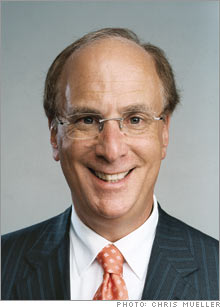(Fortune Magazine) -- Before he co-founded money-management firm BlackRock, Larry Fink, 54, was an early pioneer of the mortgage-backed-securities market. Now his firm, which went public in 1999 and merged with Merrill Lynch's investment-management business last year, oversees $1.2 trillion in assets -- and has been advising Wall Street clients reeling from the subprime lending meltdown. He spoke with Fortune's Peter Eavis about the ongoing credit crunch.
Where do you stand on interest rates?
 |
| Larry Fink, Wall Street's bond titan, weighs in on risk. |
I don't believe the Federal Reserve should ease. It's a foolish, foolish statement for people to make with the economy performing in line with the Fed's current forecast. It's a good thing for regulators to see risk premiums become more appropriate.
How does the current liquidity crisis compare with what you saw in 1998?
Oh, this is much worse. This problem is greater, broader, harder to contain. Without the central banks injecting liquidity, this could have become a big problem.
Are you buying any subprime-mortgage-backed securities right now?
No. We never really trafficked in subprime. Our CDO [collateralized debt obligation] complex has been a historical buyer of subprime, but as a firm we cut back in late 2005.
A lot of the big-name brokerages are highly exposed. If you had been heading one, would you have gone into the subprime business?
Wall Street made tens of millions in the mortgage arena over the past five years. Now we have a setback. But you can't look at the losses that people may incur this year without the context of their profitability in the past four or five years.
So you're saying it was the right call?
Depends on what we learn about the scale of losses. We saw in 2005 that it was getting a little dicey. The better firms should have downsized their role.
How broad are the ripple effects of this subprime crisis, in mortgages and beyond?
The market is struggling with the valuation of even prime mortgages. There are many fine mortgages that may be over $500,000 with good payment history, but the market is questioning the value of all mortgage- and asset-backed products. But you're not seeing as much of an effect in the corporate bond market, and certainly not in the equity markets, apart from homebuilders.
It seems that the U.S. can hardly bear interest rates above 5.5%. What does that say about our level of debt?
We as a country need to liquefy our balance sheets. It's a generational project. It's five years for some people and 20 years for others. It just takes behavior change. 